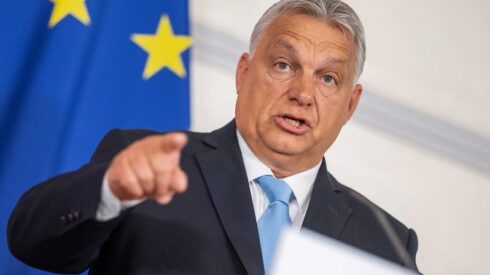Written by Uriel Araujo, researcher with a focus on international and ethnic conflicts
This week in Rome Georgia Meloni, the Italian Prime Minister, hosted Viktor Orban, her Hungarian counterpart. From 1 July to 31 December 2024, Hungary is to hold the Council of the European Union’s rotating presidency, and the meeting was part of Orban’s European tour to discuss his upcoming Council presidency programme, with him having also visited Germany and France.
With the specter of the “far-right” currently haunting Europe’s mainstream collective conscience, much has been made, amid political commentators of all stripes and colours, about the photographs of Meloni, “the populist”, and Orban, “the ultra-conservative”, together. Among other things, some have commented on how they symbolize the new Fascistized Europe, and so on. As usual, truth is a bit more complex. For instance, after this visit, Orban went to France to meet with President Emmanuel Macron, who has announced its support for Hungary’s EU program.
Meloni in turn is seeking a top commission post for Italy – and might get nothing. As I wrote, she was being courted by Ursula von der Leyen, the incumbent president of the EU Commission, who is seeking reelection and is likely to get it. I recently wrote on how the Leyen-Meloni alliance could mean the mainstreamization of Europe’s far right. Former European Commission President Jean-Claude Juncker, however, reportedly advised Leyen, telling her that she does not need Meloni and that the “majority should not be extended to the parties of the extreme right.” It seems he has been heard.
Meloni, in any case, has stated, after her meeting with Orban, that she is on the same page with Orban, especially regarding the issue of European competitiveness, the declining birth rates in the continent, and of course the need to address illegal migration (Orban is a fan of the Italian “Mattei Plan”). The Hungarian leader, however, stressed that his party will not be joining the Meloni-led European Conservatives and Reformists Group (ECR) political group.
While many commentators talk of the European “far-right” as an umbrella term for a wide range of populists, conservatives who are critical of illegal immigration, nationalists, Eurosceptics, and so on, the truth is that there is no unit within this label, with one great divide being of course the issue of Russian-European relations. And this is also the stance that mostly concerns Brussels, to the point that the European establishment could be willing to claim populists and the far-right (in a domesticated version) as “one of us”, as long as these radicals and “rebels” adopted a pro-NATO position.
One might remember that earlier this year Meloni might have had a key role in convincing Orban to agree to the deal to provide a €50 billion aid package to Ukraine. With far-right roots, Meloni’s main job, from the Brussels’s establishment perspective, has been to act as a bridge between the hegemonic centrist pro-NATO European leadership and “rebels” such as Orban himself. The way the Italian leader has just been sidelined can certainly be interpreted as a kind of political betrayal.
This Thursday and Friday, EU leaders are gathering in Brussels to, among other things, agree on the names that will be leading the European Commission, and the European Council. Italy’s Meloni, much to her annoyance, has been left on the sidelines of this pre-cooked arrangement, largely due to the fact that the European Conservatives and Reformists Group (ECR) bloc led by her is vocally critical of European integration, with a focus of stronger national sovereignty.
Orban has similarly been pretty much left out of the discussions between the more centrist European political parties. The decisions pertaining to the so-called European “top jobs” are taken by means of a qualified majority with no possibility of anyone employing veto power – something which Orban has never been shy about doing, when possible.
In any case, it still remains to be seen how things will unfold, with the likely names of Antonio Costa (Portugal) for the European Council’s presidency, Kaja Kallas (Estonia), who is one of Europe’s most vocal critics of Russia, for the role of EU’s top diplomat, and Ursula von der Leyen (Germany) for the EU executive, as the Commission chief. These names have already been announced already, and Meloni has denounced the whole affair as an undemocratic backroom kind of deal. Many could say this in fact is how things have been done for a while. So much for European consensus.
Back to Orban, for a while there has been talk about the EU’s “Hungary problem”. Not too much should be made of a Hungary presidency though: the Council has no right of initiative in fact, this lying with the European Commission, and since the 2009 Treaty of Lisbon, operates under a very tight institutional framework. The presidency does provide Orban with the opportunity to influence EU’s legislative policy. The whole situation is a major embarrassment for Brussels: as early as December 2022, the European Commission decided to freeze around €22 billion of EU cohesion funds which were intended for Budapest.
Orban stated on 27 June:
“I clearly told President Macron that Hungary is not working for Ukraine or Russia, but for peace. Hungary is not against this or that country, Hungary is against war.”
This very pragmatic and reasonable instance, however, might still be a hard pill to swallow. Right now, the EU is working on a legal “workaround” to bypass Budapest veto on buying arms for Ukraine. In a way, Hungary’s position within the European block is similar to Turkey’s own position within NATO. With a housing crisis, and the rise of a (non-homogenous) far-right, and with the reality of “Ukrainian fatigue”, Orban is certainly not Europe’s only problem to worry about.
MORE ON THE TOPIC:






